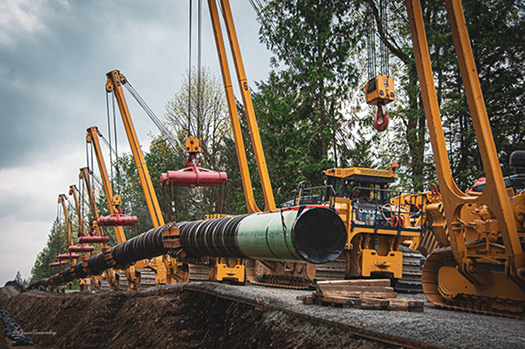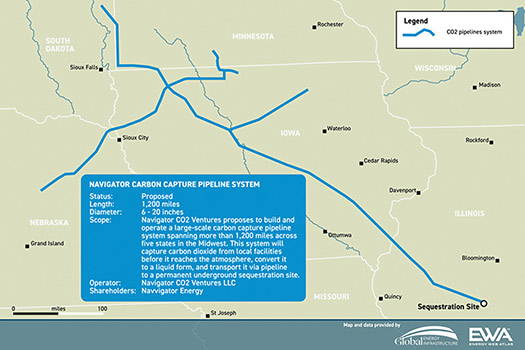November 2023, Vol. 250, No. 11
Projects
Projects November 2023
Projects November 2023
Trans Mountain Expansion Expected to Boost US Prices
Canada’s Trans Mountain oil pipeline expansion, expected to almost triple the flow of crude from Alberta to the nation’s Pacific Coast, will reshuffle North America’s supply by diverting barrels to the U.S. Midwest and Gulf Coast, analysts predict.
Its entry into the marketplace is expected to add up to $2 per barrel to prices paid by Midwest oil refineries, located adjacent to Canada’s current main export route. Plants operated by operated by BP, Citgo Petroleum, Exxon Mobil and Koch Industries, are expected to be affected.
“They will be competing for barrels that no longer transit through their region,” said a Calgary-based oil trader, told Reuters. “The market will have to reshuffle.”
The Canadian government-owned $22.81 billion (C$30.9 billion) Trans Mountain project is set to begin shipping crude early next year, although it could face up additional delays of up to a year due to a proposed route change.
When it starts operating, with the line expected to being filling in the first quarter, Canada will be able to ship an extra 590,000 bpd to Pacific ports for delivery to U.S. West Coast and Asia refiners.
PipeChina Laying Another Gas Line from Sichuan to East Coast
PipeChina started construction of a second trunk line connecting gas fields in southwest China with the east coast capable of carrying 706.3 Bcf/a (20 Bcm/a) of natural gas.
The 2,653-mile (4,269-km) pipeline will start in the southwest province of Sichuan and with a total length of 2 will join the existing pipeline grid that crisscrosses China, en route to regasification terminals in Zhejiang and Fujian provinces on the east coast, PipeChina said on its official WeChat platform.
The new project enhances the existing Sichuan-to-East line that began pumping gas in 2010 from gas fields in Dazhou in Sichuan province to Shanghai and currently transports 529.7 Bcf/a (15 Bcm/a) of gas.
The new line will be built in phases, with Stage 1,979 miles (1,576-km) western section, including 12 branches that cross the city of Chongqing and provinces of Sichuan and Hubei.
South Dakota Nixes 495-Mile CO2 Pipeline Permit
Summit Carbon Solutions was denied a permit to build 495 miles (796 km) of pipeline through the state to transport captured carbon dioxide from ethanol plants to an underground storage site.
The three-member South Dakota’s Public Utilities Commission decided unanimously against granting the application on what was set to be the first day of what was expected to be three weeks of evidentiary hearings.
Summit said in a statement that it respects the commission’s decision and plans to refine and refile its application.
PUC’s staff wrote in a filing that the commission should reject the application because county ordinances related to setbacks and other aspects of the pipeline route would be violated.
“We are hopeful that through collaborative engagement with these counties we can forge a path forward to benefit South Dakota and its citizens,” said Summit CEO Lee Blank in the statement.
The company said that 73% of landowners along its proposed South Dakota route have signed voluntary agreements allowing Summit to access their land to build the pipeline.
Russia Says It’s Finalizing Power of Siberia-2 Route to China
Russia is putting the finishing touches on the route for the Power of Siberia-2 gas pipeline to China, which is intended to traverse Mongolia, Deputy Prime Minister Alexander Novak wrote in energy ministry's in-house magazine.
Russia is trying to boost trade with Asia as economic ties with the West shrivel over Moscow's actions in Ukraine. The proposed pipeline would transport gas from the Yamal Peninsula fields in Siberia.
It wants to increase pipeline gas supplies to China by 1.76 Tcf/a (50 Bcm/a) via Power of Siberia-2, while the existing Power of Siberia pipeline is due to provide 1.34 Tcf/a (38 Bcm/a) by 2025.
“The decision for the Power of Siberia-2 gas pipeline's route is at the final stage,” Novak wrote, adding that it was “assumed” the pipeline would pass near the Siberian cities of Achinsk, Krasnoyarsk, Kansk, Sayansk, Angarsk and Irkutsk, before reaching the Buryatia region south of Lake Baikal, then the Mongolian border near the settlement of Naushki.
Gazprom began a feasibility study on the project in 2020 with a target for delivery sometime by 2030.
Democratics Ask for End to Carbon Pipeline Permitting
In a letter to the president, Democratic members of U.S. Congress called for an end to permits on new carbon dioxide pipelines, pending the completion of federal safety regulations.
“A moratorium is necessary to protect communities from the construction of pipelines that we know will soon be operated under outdated safety standards,” the letter said.
The Pipeline and Hazardous Materials Safety Administration (PHMSA), which is on the safety guidelines said the final version will be proposed in 2024.
PHMSA moved to toughen carbon dioxide pipeline standards following after a 2020 carbon pipeline breach in Mississippi sent 45 people to the hospital.
Summit Carbon Solutions, Wolf Carbon Solutions and Navigator CO2 Ventures together hope to run 3,580 miles (5,760 km) of carbon dioxide pipeline across the Midwest, Reuters reported. Carbon capture from ethanol and other industrial plants would be shipped to underground storage sites under those plans.
Keyera Completes 357-Mile Key Access Pipeline System
Keyera Corp. completed the Key Access Pipeline System (KAPS), a 357-mile (575-km) NGLs and condensate pipeline. It will transport 350,000 bpd of NGL and condensate from the Montney and Duvernay basins to Keyera's processing hub in Alberta's Industrial Heartland, Fort Saskatchewan.
At its Fort Saskatchewan facility, Keyera manages a fractionation unit with a capacity of 65,200 bpd and a de-ethanizer capable of processing 30,000 bpd.
The company also boasts an impressive total storage capacity of 15.5 million barrels in underground caverns and surface tanks. Alongside pipeline transportation of separated liquids, Keyera's Industrial Heartland infrastructure includes rail and truck terminals.
KAPS operates under the diligent care of Keyera, with a substantial 50% ownership shared by Stonepeak, a prominent alternative investment firm specializing in infrastructure and real assets.
“KAPS has been years in the making, and it is the platform that propels us forward and lets us focus on what we do best – supply responsibly produced Canadian energy,” Dean Setoguchi, president and CEO of Keyera, said.
In December 2022, pipeline operator Pembina Pipeline Corp.'s joint venture with KKR & Co. agreed to sell its 50% stake in KAPS to Stonepeak Partners for $484.89 million (C$662.5 million).
Iraq Waiting for Word from Turkey on Oil Pipeline, Baghdad Says
Iraq said not received formal notification from Turkey on the readiness of the oil exports pipeline, two senior Iraqi oil officials said.
“We as an oil ministry need to be informed officially by the Turkish side about the recent developments on the pipeline status. We heard about it in media only,” said a senior oil ministry official, told Reuters speaking on condition of anonymity.
The official spoke following Turkish Energy Minister Alparslan Bayraktar's prior comments in which he said the oil pipeline was ready.
Turkey ended shipments through Iraq’s northern oil export route after an arbitration ruling in March by the International Chamber of Commerce (ICC) ordered it to pay Iran damages for unauthorized exports between 2014 and 2018.







Comments